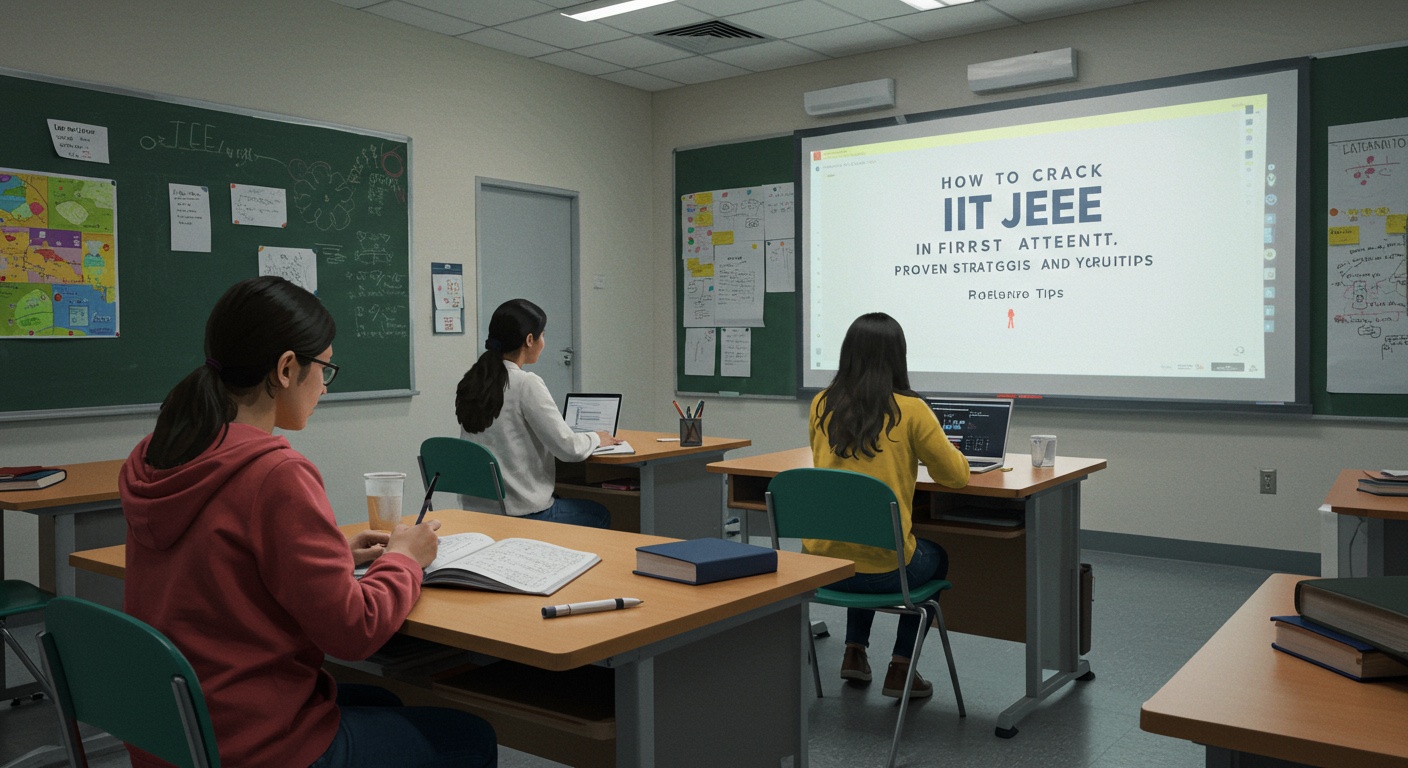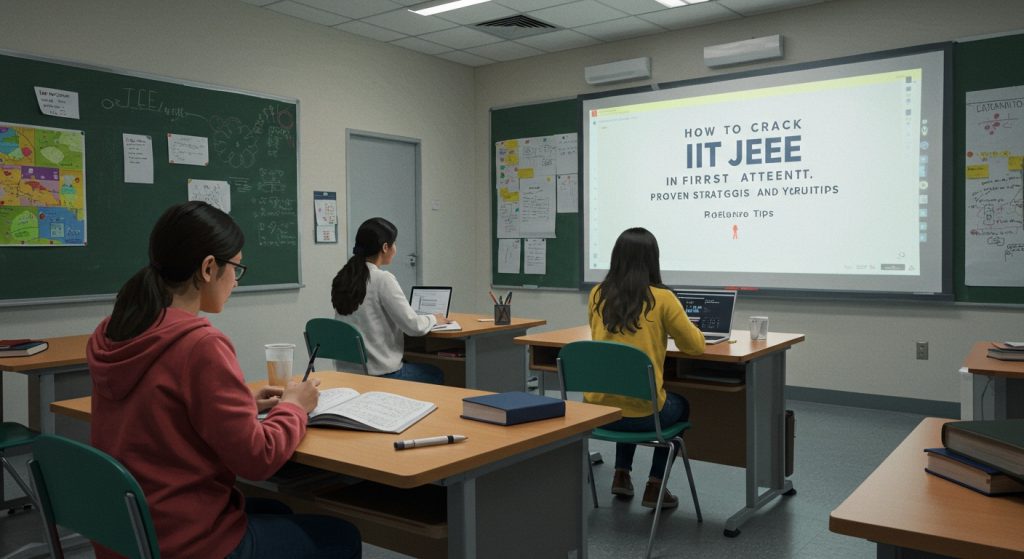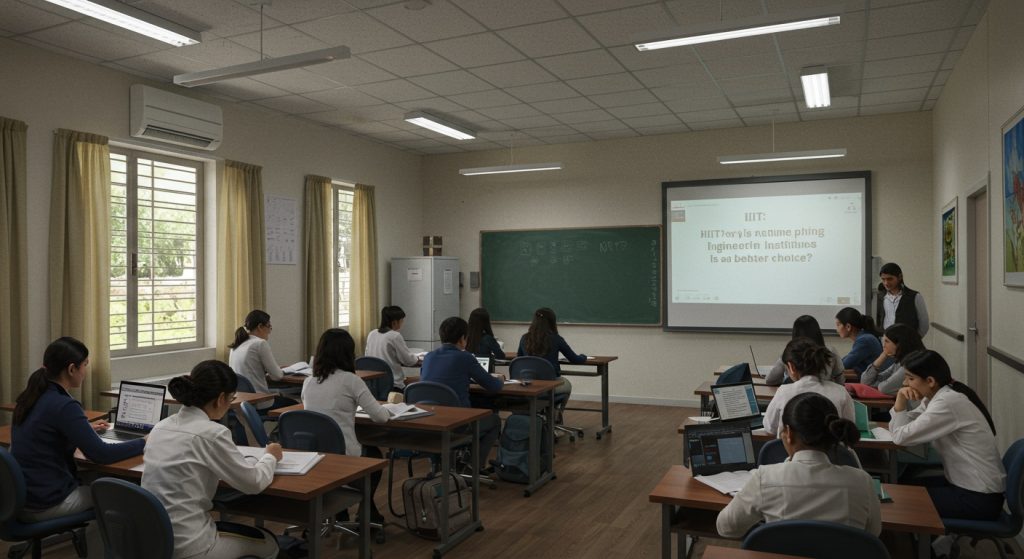Cracking the IIT JEE in your first attempt demands more than just rote learning; it requires strategic mastery. Think of it as navigating a complex maze where understanding fundamental concepts like vector calculus and organic reaction mechanisms is only half the battle. You need to learn how to apply these principles under immense pressure. This isn’t about cramming formulas; it’s about building a robust problem-solving toolkit. We’ll dissect proven techniques, from time management strategies refined by past toppers to effective methods for tackling tricky numerical problems. Learn how to optimize your study schedule, leverage mock tests for real-time performance analysis. Ultimately, maximize your potential for success in that crucial first attempt.

Understanding the IIT JEE Examination
The Joint Entrance Examination (JEE) is the gateway to India’s prestigious Indian Institutes of Technology (IITs) and other top engineering colleges. It’s conducted in two stages: JEE Main and JEE Advanced. JEE Main serves as an eligibility test for JEE Advanced. Also allows admissions into NITs, IIITs. Other centrally funded technical institutions. JEE Advanced is specifically for admission into the IITs.
Cracking the JEE in the first attempt requires a strategic approach, consistent effort. A thorough understanding of the exam pattern and syllabus. It’s not just about intelligence; it’s about smart preparation and execution.
Crafting a Realistic Study Plan
A well-structured study plan is the cornerstone of JEE preparation. It should be personalized to your strengths, weaknesses. Available time. Here’s how to create one:
- Assess Your Current Standing: Begin by evaluating your proficiency in each subject (Physics, Chemistry. Mathematics). Identify your strong and weak areas.
- Set Achievable Goals: Divide the syllabus into smaller, manageable chunks. Set daily and weekly targets that are realistic and measurable.
- Allocate Time Wisely: Dedicate more time to your weaker subjects while ensuring you regularly revise the stronger ones.
- Include Revision Time: Regular revision is crucial for retaining details. Schedule dedicated revision slots in your plan.
- Incorporate Mock Tests: Mock tests are essential for simulating the actual exam environment. Include them regularly in your study plan.
- Be Flexible: Life happens. Build flexibility into your plan to accommodate unexpected events or setbacks.
Mastering the Syllabus: A Subject-Wise Approach
Each subject in the JEE syllabus requires a different approach. Here’s a breakdown of how to tackle each one:
Physics
Physics is all about understanding concepts and applying them to solve problems. Focus on:
- Conceptual Clarity: Ensure you have a strong grasp of fundamental concepts. Don’t just memorize formulas; comprehend their derivations and applications.
- Problem-Solving Skills: Practice a wide variety of problems, ranging from simple to complex. This will help you develop your problem-solving skills.
- vital Topics: Mechanics, Thermodynamics, Electromagnetism. Optics are generally considered high-weightage topics.
- Real-World Applications: Try to relate physics concepts to real-world phenomena. This will make learning more engaging and help you comprehend the subject better.
Chemistry
Chemistry requires a balance of understanding concepts and memorizing facts. Focus on:
- Organic Chemistry: Master the fundamentals of organic chemistry, including nomenclature, reactions. Mechanisms.
- Inorganic Chemistry: Focus on understanding the periodic table, chemical bonding. Coordination compounds. Memorize crucial reactions and properties.
- Physical Chemistry: comprehend the concepts of thermodynamics, chemical kinetics. Electrochemistry. Practice numerical problems regularly.
- NCERT is Key: NCERT textbooks are crucial for building a strong foundation in chemistry.
Mathematics
Mathematics requires consistent practice and a strong understanding of concepts. Focus on:
- Conceptual Understanding: Ensure you have a solid understanding of the fundamental concepts.
- Practice Regularly: Practice is key to mastering mathematics. Solve a variety of problems from different sources.
- essential Topics: Calculus, Algebra, Coordinate Geometry. Trigonometry are generally considered high-weightage topics.
- Formula Memorization: Memorize vital formulas and theorems.
Effective Study Techniques
Using the right study techniques can significantly improve your learning efficiency. Here are some proven techniques:
- Active Recall: Test yourself regularly on the material you’ve learned. This helps reinforce your understanding and identify areas where you need more work.
- Spaced Repetition: Review material at increasing intervals. This helps you retain details for longer periods.
- Feynman Technique: Explain concepts in simple terms, as if you were teaching someone else. This helps you identify gaps in your understanding.
- Mind Mapping: Use mind maps to visually organize insights and connect different concepts.
- Pomodoro Technique: Study in focused bursts with short breaks in between. This helps you stay focused and avoid burnout.
The Power of Mock Tests
Mock tests are an indispensable part of JEE preparation. They simulate the actual exam environment and help you assess your preparation level. Here’s how to make the most of them:
- Regularity: Take mock tests regularly, preferably on the same day and time as the actual exam.
- Analysis: review your performance after each mock test. Identify your mistakes and areas where you need to improve.
- Time Management: Use mock tests to improve your time management skills. Learn to allocate time effectively to different sections.
- Exam Temperament: Mock tests help you develop exam temperament and reduce anxiety.
- Different Sources: Solve mock tests from various sources to get exposure to different types of questions.
Leveraging Resources: Books and Online Platforms
Choosing the right resources is crucial for effective preparation. Here are some recommended books and online platforms:
Recommended Books
- Physics: H. C. Verma (Concepts of Physics), I. E. Irodov (Problems in General Physics)
- Chemistry: NCERT Textbooks, O. P. Tandon (Organic Chemistry), J. D. Lee (Inorganic Chemistry)
- Mathematics: R. D. Sharma (Mathematics), Arihant Series (Mathematics)
Online Platforms
- NPTEL: Offers free online courses on various engineering subjects.
- Khan Academy: Provides free educational resources, including video lectures and practice exercises.
- Unacademy, Vedantu, Physics Wallah: These platforms offer structured courses, live classes. Mock tests.
Maintaining a Healthy Lifestyle
Your physical and mental well-being plays a significant role in your JEE preparation. Here’s how to maintain a healthy lifestyle:
- Proper Sleep: Get at least 7-8 hours of sleep every night.
- Healthy Diet: Eat a balanced diet rich in fruits, vegetables. Whole grains. Avoid junk food and sugary drinks.
- Regular Exercise: Exercise regularly to relieve stress and improve your focus.
- Stress Management: Practice relaxation techniques like meditation and yoga to manage stress.
- Stay Hydrated: Drink plenty of water throughout the day.
Dealing with Exam Stress and Anxiety
Exam stress and anxiety are common during JEE preparation. Here are some tips to deal with them:
- Stay Positive: Maintain a positive attitude and believe in yourself.
- Talk to Someone: Talk to your friends, family, or teachers about your concerns.
- Take Breaks: Take regular breaks to relax and recharge.
- Avoid Comparisons: Don’t compare yourself to others. Focus on your own progress.
- Seek Professional Help: If you’re struggling with severe anxiety, seek professional help from a counselor or therapist.
Common Mistakes to Avoid
Avoiding common mistakes can significantly improve your chances of success. Here are some mistakes to avoid:
- Procrastination: Avoid procrastinating and stick to your study schedule.
- Ignoring Weak Areas: Don’t ignore your weak areas. Focus on improving them.
- Memorizing without Understanding: Don’t just memorize formulas and concepts. Comprehend them thoroughly.
- Lack of Revision: Regular revision is crucial for retaining data.
- Neglecting Health: Don’t neglect your physical and mental health.
Remember, aiming for the Top IITs is a challenging but achievable goal with the right strategy and dedication.
The Final Week: Strategies for Success
The week leading up to the JEE exam is crucial. Here’s how to approach it:
- Focus on Revision: Concentrate on revising vital concepts and formulas. Avoid learning new topics.
- Solve Previous Year Papers: Solve previous year’s JEE papers to get familiar with the exam pattern and difficulty level.
- Relax and Rest: Get plenty of rest and avoid stressing yourself out.
- Stay Positive: Maintain a positive attitude and believe in your preparation.
- Plan Your Exam Day: Plan your exam day logistics, including transportation, what to carry. Where to report.
Conclusion
Let’s view this first attempt as a crucial diagnostic test, not a final verdict. You’ve now armed yourself with proven strategies, from mastering NCERT fundamentals to simulating the exam environment through consistent mock tests. Remember, the IIT JEE isn’t solely about intelligence; it’s about strategic application and unwavering resilience. The Road Ahead Consider your performance on practice papers as valuable data points. If you struggled with organic chemistry, revisit those reaction mechanisms. If time management was an issue, dedicate specific blocks to speed-solving techniques. Looking ahead, expect even more emphasis on conceptual understanding in the JEE. Move beyond rote learning; strive to truly grasp the ‘why’ behind every concept. The next step is to refine your strategy based on your weaknesses and continuously track your progress. Don’t let setbacks discourage you. The path to IIT JEE is a marathon, not a sprint. Embrace the challenge, learn from your mistakes. Believe in your potential. As you work towards your goal, remember to take time for yourself and manage stress. The journey is just as vital as the destination. This journey is similar to navigating higher education as explained in this article.
More Articles
Engineering vs. Medical Careers: Which Path Offers Better Long-Term Financial Rewards?
Investing in Your Future: A Comparison of Engineering and Medical School Expenses
Automation’s Evolution: Understanding Its Effects on Modern Engineering Roles and Skills Demanded
Recharge and Renew: Effective Strategies to Overcome Career Burnout Fast
FAQs
So, what’s the big deal about cracking the JEE in the first attempt anyway?
Well, think of it this way: it saves you a whole year (or more!) of intense studying and potential stress. Plus, colleges often look favorably on candidates who nail it the first time. It shows dedication, good planning. A solid understanding of the concepts. , it’s just less hassle and a confidence boost!
Okay, I’m aiming for that first attempt success. What’s the most crucial strategy to adopt?
Hands down, it’s consistent, focused study. Don’t try to cram everything in the last few months. Start early, create a realistic study schedule that you can actually stick to. Review regularly. Consistency is key – small, steady progress beats sporadic bursts of effort any day.
Everyone talks about NCERT. Is it really that essential for JEE?
Absolutely! NCERT textbooks are your foundation. They cover the fundamental concepts that JEE builds upon. Master them inside and out before moving on to more advanced material. Think of NCERT as the base of your JEE pyramid – a wobbly base means a wobbly pyramid!
What about coaching classes? Are they essential for first-attempt success?
Not necessarily essential. They can be incredibly helpful. Good coaching centers provide structured learning, experienced teachers, regular tests. A competitive environment. But, if you’re disciplined and can manage your studies effectively on your own, self-study is definitely possible. The key is to honestly assess your strengths and weaknesses.
Practice makes perfect, right? How many mock tests should I be taking?
You’re on the right track! Focus on quality over quantity. Taking a mock test every week or two in the months leading up to the exam is a good starting point. As the exam gets closer, increase the frequency. The goal isn’t just to take the tests. To review your performance, identify your weak areas. Work on them. That’s where the real learning happens.
I’m feeling super stressed! Any tips for managing anxiety during JEE prep?
Totally understandable! JEE prep is intense. Make sure you’re getting enough sleep, eating well. Taking regular breaks. Exercise is a fantastic stress reliever. And don’t be afraid to talk to someone – a friend, family member, or counselor – if you’re feeling overwhelmed. Remember, your mental health is just as vital as your academic preparation.
What if I get stuck on a problem and can’t figure it out?
Don’t panic! First, try re-reading the problem carefully and looking for clues. If you’re still stuck, try breaking it down into smaller parts. If all else fails, move on and come back to it later. Sometimes a fresh perspective can make all the difference. And don’t hesitate to ask for help from a teacher, friend, or online forum. Collaboration can be a lifesaver!



